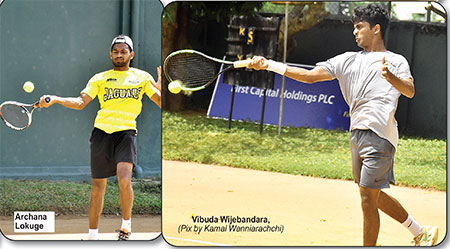Sports
‘We can turn the tables on England. This series is 50-50’ – Mahela Jayawardene
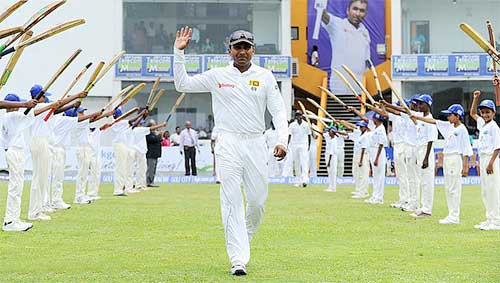
Jayawardene isn’t keen on taking up a permanent role in the Sri Lankan setup despite his status(Getty)
Sri Lanka are raring to go ahead of facing an under-prepared England for a two-Test series, and the hosts see an opportunity for an upset.
England head into the series without Jofra Archer and Ben Stokes and with less than two days of match practice, while Sri Lanka are keen to bounce-back after a series defeat to South Africa.
Sportsmail’s Nasser Hussain caught up with Sri Lanka legend and Mumbai Indians coach Mahela Jayawardene ahead of the series.
NH:
I know Sri Lanka have asked you in the past, and you felt they hadn’t taken on board some of your proposals, but in the long term would you like to coach the national side?
MJ:
For me the biggest hurdle is to be involved full-time, whether it’s franchise cricket or a national team. I don’t see myself being a coach who’s going to be involved with one team for 12 months a year. That’s not enjoyable for me.
It’s got nothing to do with Sri Lanka Cricket as such, and I’ve always said I’m happy to contribute and help the team — as long as what I see is wrong has been corrected. It hasn’t happened over the years.
I don’t want to walk in and be a figure in a process where I know the system hasn’t allowed cricketers or the team to evolve.
NH:
The talent in Sri Lanka has always been remarkable. What is it like at the moment?
MJ:
The raw ingredients are there. It’s just that a lot of the guys struggle with the pathway after school. The domestic structure has so many teams, so the quality gets diluted pretty quickly, and people make wrong decisions.
Not all the coaches are good enough, so we lose a lot of talent in that process. It’s not a professional setup at that level, and a lot of the guys give up and do other things, like league cricket in Australia or England.
NH:
Is Test cricket still financially viable in Sri Lanka?
MJ:
We still have an appetite for Test cricket. Because of the history of Sri Lanka’s Test team, they all want to play cricket at that level. But if you don’t improve and evolve, five or 10 years down the line we will have guys who only want to play white-ball cricket.
The recent T20 Lankan Premier League was good. We’ve needed something like that for the last 10 years, to make the game at that level financially viable.
NH:
The Test team have just come back from South Africa with a lot of injuries. Where are they at the moment?
MJ:
I was pretty pleased with the way they started in South Africa, putting nearly 400 on the board at Centurion. But the bowlers broke down, and that was a real issue. Guys who played at the LPL still had niggles, and they went into the second Test quite depleted.
For the English tour, we’ve got Angelo Mathews coming back after the injury, and Dinesh Chandimal should be fit as well — two experienced guys in the middle order to support Dimuth Karunaratne at the top. It’s about that discipline in the longer format: how do you cope with pressure for four to five days?
NH:
Any promising players England fans might not have heard of?
MJ:
It’s unfortunate that Dhananjaya de Silva has a long-term injury, but Kusal Mendis is a talent, and has scored seven hundreds in his short Test career. He knows how to go big.
And Sri Lankan have found two all-rounders: Wanindu Hasaranga, the leg-spinner, who bats at seven, and seamer Dasun Shanaka, who bowled really well in South Africa.
NH:
Is Mickey Arthur the right man to coach them at the moment?
MJ:
Yeah, he’s one of those guys who’s quite methodical and regimental, but he’s a good coach — a players’ coach. We need to give Mickey some time with the team, because he’s proven himself with a lot of international teams.
NH:
And he tends to speak his mind. He did an interview the other day when he said ‘I don’t think the pitch at Galle will turn: I know it will turn.’ Are you expecting a bunsen burner at Galle?
MJ:
You know Galle: it’s going to slow down, and start turning. So those first two days are crucial, and after that it’s going to be a grind. It will be quite interesting to see how the second Test match is going to pan out, because you’re playing at the same venue.
They’ll definitely make sure Sri Lanka have that advantage of playing at Galle, but the England boys have played there many times.
NH:
Where do you see England at the moment, and in particular their playing of spin. Is that still a nemesis for them?
MJ:
I think it can be. It depends on the tempo they want to play. The modern England team plays at a different tempo, but you still need someone to grind out an innings — Cooky (Alastair Cook) has done that in the past. Someone has to do that now, whether it’s Rooty (Joe Root) or someone else.
The other guys are much more high-tempo players, so how you balance that is crucial. And which way do you go with the bowlers? You don’t have the pace of Jofra (Archer), so who’s going to take up that role on a slow wicket? Sometimes you need extra firepower to get something going.
NH:
As you say, there’s no Jofra, no Ben Stokes, and Moeen Ali is ill. Is this an opportunity for Sri Lanka, on a turner, to get payback for England’s 3-0 win there in 2018?
MJ:
Yeah, it is. Even though Sri Lanka didn’t do well in South Africa, they’ll see this as a very good opportunity.
The first two days will set the tone. But England have two good experienced bowlers in Broady (Stuart Broad) and Jimmy (Anderson), who understand what needs to be done in these conditions. They will fall back on them. It’ll be interesting to se if they pick both in the same Test.
NH:
How much did the 3-0 defeat hurt Sri Lanka, and how much is it feeding into their mindset now?
MJ:
It did hurt Sri Lanka a lot, although it feels like a lifetime ago now. They had opportunities in that series, but never grabbed them, and England had that experience to control sessions. They were dominant.
But these two Test matches are at Galle, whereas last time it was in three different places, and Sri Lanka have a much better record at Galle. It will suit the current group of players. I don’t think Sri Lanka will be thinking too much about last time around.
NH:
Do you worry about the mental and physical wellbeing of players when they’re spending so much time in bubbles?
MJ:
Yeah, that’s something you have to look at. We used to have three weeks’ R&R with our families between tours, but now they’re straight into another bubble.
That’s when player management is important. When you see guys who aren’t mentally fresh, you might have to let them go home for two or three weeks. Going bubble to bubble is always going to have an impact. If this runs through 2021, that’s going to be a long stretch for a lot of cricketers.
NH:
When I went to Sri Lanka, England were never favourites. Do you see this England as favourites?
MJ:
With Stokes missing, England don’t have that same experience in the top order, so I make it 50-50. I don’t think they’re going as favourites. I think Sri Lanka have something in them. (Daily Mail)
- News Advertiesment
See Kapruka’s top selling online shopping categories such as Toys, Grocery, Flowers, Birthday Cakes, Fruits, Chocolates, Clothing and Electronics. Also see Kapruka’s unique online services such as Money Remittence,News, Courier/Delivery, Food Delivery and over 700 top brands. Also get products from Amazon & Ebay via Kapruka Gloabal Shop into Sri Lanka.
Sports
Imran steals the show!

(This article by The Island’s respected cricket columnist Rohan Wijeyaratne first appeared in these pages 16 years ago; on the 11th of June 2005. As World Cup winning former captain and current Prime Minister of Pakistan Imran Khan has just visited the island, we reproduce this article in today’s edition)
In my youth – which is to say, quite a long time ago – I would often go to the YMCA canteen for a snack and a tea after whatever business that brought me to the Fort. Doing the same recently more for old times sake than anything else, I saw a familiar figure ahead of me heading in the same direction. Quickening my step and drawing abreast, I introduced myself to the gentleman concerned. He was none other than my old school English teacher, V. Thanabalasingham.
Not just a teacher, but an Institution
Those of you who may have passed through the portals of Ananda College during the 1960s and the early 70s and no doubt been well rounded in many ways, will admit to a man that when it came to the teaching of English, the name Thanabalasingham held no peer. In his prime, he was not just a brilliant teacher but an Institution. And volumes wouldn’t suffice to do him justice – such was the impact he made on all whom he touched, be it with the brilliance of Thackeray, Dickens, Chaucer or the Direct Method English Course that served as our bread and butter in English education at the time.
Another, from a different mould
Another teacher from an entirely different mould was Upali Ratnayake, now the Executive Director of CIMA. At the time he was introduced to us at the ‘A’ level stage, he appeared to our free spirits a cut above the rest. He acquired this status by doing exactly the opposite of what he was expected to do, which was to teach us English as a preparatory step towards an easier passage through University. Upali Ratnayake actually taught us nothing. Yet we learnt a good deal off him, discussing almost everything other than the subject he was paid for! His most endearing virtue was that he never spoke to us from a great height. And in that process, he taught us one of the most lasting lessons in life.
Several decades later, I nearly fell off my chair to receive a phone call from him inviting me to the BMICH on the 28th of May where Imran Khan and Kumar Sangakkara were due to speak at the CIMA Global Leaders Summit. The topics for discussion were “Passion for Perfection” and “Ordinary people in extraordinary acts.” The topics and the speakers seemed irresistible. And so I went.
What a speech!
I wasn’t disappointed. Neither were hundreds of others present. And predictably, Imran stole the show. Blessed with a presence that would have put any Grecian god to second class status, this tall, elegant and immensely handsome man spoke with such brilliance, clarity and articulation, the end result was as gripping as it was inspiring. In his wake, those who followed appeared cumbersome and dreary, almost like how Kenny Mackay would appear after the brilliance of a vintage Sobers or a Dexter! Kumar Sangakkara having to make do with less time than was his rightful share went largely unheard, tending to speak more to his fellow panelists than his audience. He will learn. As a probable hot contender to the top post after Atapattu, there will be many more occasions where he will be required to speak in public.
“Ambition must be upgraded, never downgraded”
Imran was of the view that all humans were endowed with limitless potential. Their limits if any, were often self imposed. Those who achieved extraordinary heights were those who dared to go beyond their self imposed limits. They thought big, dreamed big and did not allow their limitations to get in the way of achieving their dreams. He drew parallels from his own experiences in cricket, his cancer hospital project and his involvement in national politics to establish the point.
The four secrets
Starting with cricket, and drawing parallels with other legends including Zaheer Abbas, Imran stressed the need for a clear vision, the hunger to succeed, the willingness to sacrifice and self belief as being the four secrets to achieve one’s vision. Self belief was a factor which Abbas, despite all his God given gifts, had in very short supply. Imran, on the other hand, was full of it (sometimes foolishly!), because he never thought he ever could lose a game each time he stepped on to a cricket field. He gave many examples of it, including the victories against the might of the ‘invincible’ West Indians in 1986 against all odds. And that, despite having requested and got, ‘neutral’ umpires in a home series in Pakistan! He just wanted to make sure that when they won, there would be none to say that the umpires had anything to do with it!
Drawing from examples of his own life, Imran said that in all one’s life, one would hear others say why something cannot be done. That if accepted, would be the start of everyone’s downward spiral. Ambition he said, must be upgraded, never downgraded. And the more you pit your mind against the winds that resist you from reaching your ambition, the stronger your mind will become. Therefore, ambition must take precedence over everything. And towards achieving that, one should be willing to sacrifice anything. “Compromise” said Imran “for your vision, but never ever on your vision.” Great words!
Why the 3rd world is the 3rd world!
Relating what made him take to politics, Imran said that the problem with the third world was that the ruling elite would put itself above the law and deprive the ordinary folk of any justice. Hence his political movement was primarily meant to establish the rule of law in his country, where the weak and the strong were equal in the eyes of the law. “No society in the history of mankind has ever progressed without the rule of the law. The reason why the third world remained the third world was because it had very poor rule of the law. The elitist types did whatever they wished and got away with it, while the common man and the small and medium industrialist were all deprived of justice.” None could have spoken a truer word!
The ways of the mafia
Imran went on to say that when fighting for the rule of Law, one would be pitted against entrenched vested interests; the most powerful elite in the country. These were those who could buy justice. In Imran’s case, these were men who were also his good friends. Yet he preferred to take on the mantle of a social pariah instead, preferring to stand steadfast to his vision. The mafia usually reacts in such situations in either of two ways. They would either eliminate you or make you join the system. Just five months after his party was formed, he was offered 30 seats in Parliament out of 270. Imran refused, because he realized he had no chance of winning against entrenched political families that controlled his country. He knew the moment he joined them, he would need to compromise with his vision. So he refused, and got wiped out at the elections.
Refusing the Prime Ministership of Pakistan
When General Musharaff took over with Pakistan’s fourth military dictatorship in its brief history, he made all the right noises such as ridding the country of “sham” democracy and so on. No sooner Musharaff formed his own party, Imran was yet again invited, this time to become the Prime Minister of Pakistan. “But when I discovered that joining his coalition meant joining the biggest crooks in the country,” he had no difficulty in refusing. He was chided for his decision by many who argued that he could have joined and then fixed things up. But Imran said the decision was easy to make, as his vision was very clear. And it was one’s vision that decided when to compromise and when not to.
Imran’s vision
Imran’s vision was an independent and credible judicial system in Pakistan. So he asked himself the question, could General Musharaff afford an independent judiciary? The answer to him was obvious. If such a judicial system prevailed, most of the powerful men in his country would be tried for treason under article six of the country’s constitution. The sentence for treason was death. And he was therefore convinced that neither Musharaff, nor those around him could afford an independent and credible judicial system. And so, with his firm “No” Imran watched his party being destroyed yet again, to one seat, in parliament. This time it was by General Musharaff himself.
(To be continued tomorrow)
Sports
Spinners give India early advantage in third Test
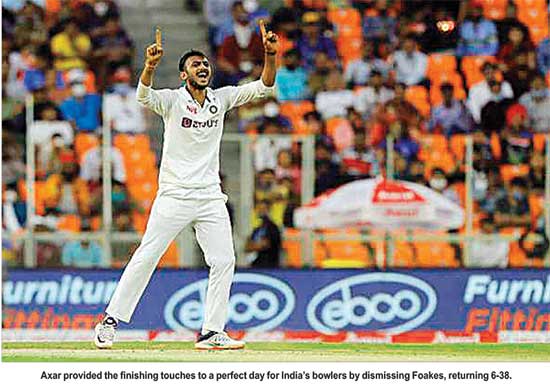
Indian spinners shot England out for just 112 inside two sessions with Ravichandran Ashwin and Axar Patel sharing the spoils after pacer Ishant Sharma opened the floodgates in his milestone 100th match on the opening day of the day-night third Test in Ahmedabad yesterday.
England were all out for 112 in 48.4 overs in the second session on a spin-friendly Motera pitch with Patel (21.4-6-38-6) grabbing his second five-for in his second Test while Ashwin (16-6-26-3) took three.
Openers Rohit Sharma (5) and Shubman Gill (0 ) negotiated five overs to take India to five for no loss at the dinner break.
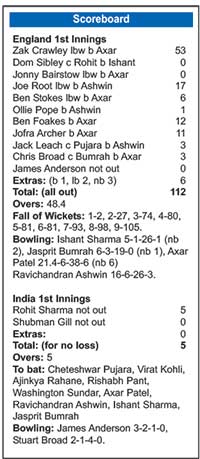 Gill, however, survived after TV umpire ruled him not out in the third over after England claimed for a catch.
Gill, however, survived after TV umpire ruled him not out in the third over after England claimed for a catch.
Ishant, only the second Indian fast bowler after Kapil Dev to play in 100 Tests, fittingly took India’s first wicket in the third over as he dismissed opener Dominic Sibley for nought.
Thereafter, it was all an Ashwin and Patel show as the duo bamboozled the England batsmen to complete the submission, except for the other opener Zak Crawley, who hit an eminently delectable half-century. Six English wickets fell in the second session.
England did not have any substantial partnership with the 47-run stand for the third wicket being the highest. They lost their last seven wickets for just 38 runs.
Crawley’s brilliance was, however, neutralised by the Indian spinners as England were left reeling at 81 for four going into tea after an exciting opening session in the pink ball Test.
Two wickets fell in as many overs after the resumption of the second session, with Ashwin and Patel taking one each, to reduce England to 81 for 6.
Ashwin sent Ollie Pope’s (1) off-stump cart-wheeling with a beauty of a delivery, bowling round the wicket, before Patel trapped Ben Stokes (6) LBW in the next over with a ball that spun in.
Jofra Archer (11) did a tad better as he hit a four in the second ball he faced and another boundary off Ashwin. But, Patel had him soon, cleaning up his off-stump to send England innings into a mess.
England’s rapid slide continued with Jack Leach edging one to the gully where Cheteshwar Pujara took a low catch off Ashwin, though the TV umpire took time to confirm the decision.
Crawley’s effort was the only silver lining for England. Having missed the first two Tests due to a freak wrist injury, the stylish right-hander’s driving was elegance personified as he hit ten boundaries during his 84-ball 53.
Sports
Top players secure third round places
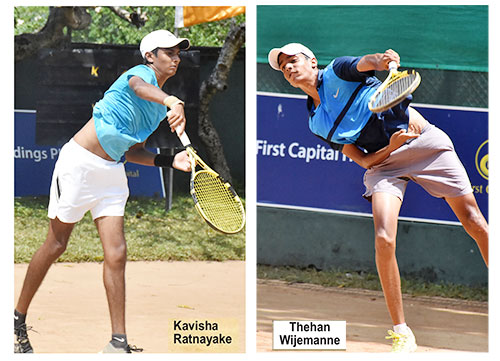
SSC Open Ranking Tennis
Thehan Wijemanne, Kavisha Ratnayake, Vibuda Wijebandara, Savith Weerasinghe, Kiran Viravanathan, Archana Lokuge advanced to the men’s singles third round at the SSC Open Ranking tennis tournament on Tuesday.
Some of the leading players fighting to improve on their impressive performances produced at the Tennis Nationals and the Colombo Championships during recent weeks knocked out their opponents easily to secure third round places.
